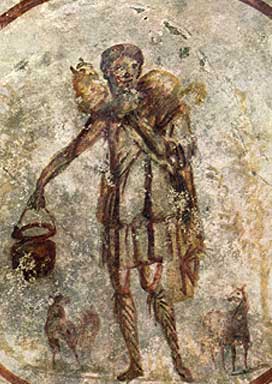History of Christianity
History of Christianity traces the development and growth of Christianity from its beginnings as a Jewish sect in the 1st century in the Roman Empire to its global presence in the modern era. Christianity, centered on the life, teachings, death, and resurrection of Jesus Christ, has played a pivotal role in the shaping of Western civilization and has spread to every continent, influencing cultures, languages, and histories.
Origins and Early Christianity[edit | edit source]
Christianity began in the 1st century AD as a sect within Judaism. It was founded on the teachings, miracles, death, and resurrection of Jesus, whom Christians believe to be the Messiah (Christ) prophesied in the Hebrew Bible. Early Christians, including the Apostles and followers of Jesus, were predominantly Jewish and observed Jewish law. The spread of Christianity beyond Jewish communities is largely attributed to the missionary efforts of Paul the Apostle, who established Christian communities throughout the Roman Empire.
Spread in the Roman Empire[edit | edit source]
Initially, Christianity was viewed with suspicion by Roman authorities, who often persecuted its followers. Despite this, the religion grew, appealing to a wide range of social classes and spreading beyond the Jewish diaspora. The conversion of Constantine the Great in the early 4th century was a turning point for Christianity. In 313, the Edict of Milan granted religious freedom within the empire, and Christianity began to transition from a persecuted sect to the dominant religion. In 380, the Edict of Thessalonica made Christianity the state religion of the Roman Empire.
Middle Ages[edit | edit source]
During the Middle Ages, Christianity expanded throughout Europe, often accompanying the political and military expansion of Christian kingdoms and empires. The period saw the establishment of monastic orders, the spread of monasticism, and the founding of universities. The Roman Catholic Church emerged as a powerful institution, influencing every aspect of life. The Eastern Orthodox Church also played a central role in the Byzantine Empire. The Great Schism of 1054 formally divided Western Catholicism from Eastern Orthodoxy.
Reformation and Counter-Reformation[edit | edit source]
The 16th century witnessed the Protestant Reformation, a movement initially sparked by Martin Luther's 1517 critique of church practices and doctrine. The Reformation led to the creation of numerous Protestant denominations and significantly altered the religious and political landscape of Europe. The Roman Catholic Church responded with the Counter-Reformation, initiating reforms and clarifying Catholic doctrine to address the challenges posed by Protestantism.
Modern Era[edit | edit source]
The modern era has seen the continued spread of Christianity around the globe, including significant growth in Africa, Asia, and the Americas. The 20th century was marked by the Ecumenical Movement, aimed at fostering unity among Christian denominations. Today, Christianity is the world's largest religion, with diverse expressions and practices.
Challenges and Controversies[edit | edit source]
Throughout its history, Christianity has faced numerous challenges and controversies, including debates over doctrine, the relationship between church and state, and issues of morality and social justice. In recent decades, the church has confronted questions related to sexual ethics, the role of women, and the need for interfaith dialogue.
Conclusion[edit | edit source]
The history of Christianity is a complex tapestry of faith, conflict, and transformation. From its humble beginnings to its role as a global religion, Christianity has profoundly influenced human history and culture.
Search WikiMD
Ad.Tired of being Overweight? Try W8MD's physician weight loss program.
Semaglutide (Ozempic / Wegovy and Tirzepatide (Mounjaro / Zepbound) available.
Advertise on WikiMD
|
WikiMD's Wellness Encyclopedia |
| Let Food Be Thy Medicine Medicine Thy Food - Hippocrates |
Translate this page: - East Asian
中文,
日本,
한국어,
South Asian
हिन्दी,
தமிழ்,
తెలుగు,
Urdu,
ಕನ್ನಡ,
Southeast Asian
Indonesian,
Vietnamese,
Thai,
မြန်မာဘာသာ,
বাংলা
European
español,
Deutsch,
français,
Greek,
português do Brasil,
polski,
română,
русский,
Nederlands,
norsk,
svenska,
suomi,
Italian
Middle Eastern & African
عربى,
Turkish,
Persian,
Hebrew,
Afrikaans,
isiZulu,
Kiswahili,
Other
Bulgarian,
Hungarian,
Czech,
Swedish,
മലയാളം,
मराठी,
ਪੰਜਾਬੀ,
ગુજરાતી,
Portuguese,
Ukrainian
Medical Disclaimer: WikiMD is not a substitute for professional medical advice. The information on WikiMD is provided as an information resource only, may be incorrect, outdated or misleading, and is not to be used or relied on for any diagnostic or treatment purposes. Please consult your health care provider before making any healthcare decisions or for guidance about a specific medical condition. WikiMD expressly disclaims responsibility, and shall have no liability, for any damages, loss, injury, or liability whatsoever suffered as a result of your reliance on the information contained in this site. By visiting this site you agree to the foregoing terms and conditions, which may from time to time be changed or supplemented by WikiMD. If you do not agree to the foregoing terms and conditions, you should not enter or use this site. See full disclaimer.
Credits:Most images are courtesy of Wikimedia commons, and templates, categories Wikipedia, licensed under CC BY SA or similar.
Contributors: Prab R. Tumpati, MD





